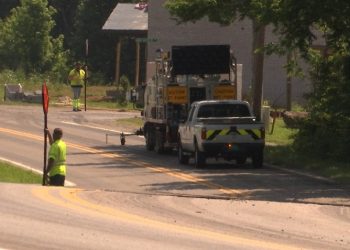Maryville, TN – Unexpected flooding in Cocke County last week has left local officials grappling with the aftermath, as questions about communication and preparedness remain unanswered. The flooding, caused by the release of water from the Walters Dam in North Carolina on December 29, led to significant damage in Hartford, particularly to roads already weakened by the devastation of Hurricane Helene.
According to Cocke County Mayor Rob Mathis, the release of water took local officials by surprise. Neither he nor the county’s Emergency Management Agency (EMA) Director were notified in advance, despite a Duke Energy representative claiming that the county had been informed just after 1 p.m. on the day of the flood about the potential for increased flows in the Pigeon River. Mathis acknowledged the situation, emphasizing that no one was blaming Duke Energy, but noted that the incident highlighted a need for better communication moving forward.
“That’s one piece we’re working on proactively: making sure that we have more open and reliable communication with Duke Energy,” Mathis explained. “This isn’t just about Duke Energy; it’s about improving communication across the board.”
The floodwaters not only inundated roads in Hartford but also caused significant damage to infrastructure that was still recovering from the impact of Helene. Though the county’s Highway Department has patched some of the affected roads, repairs remain incomplete, with Mathis stressing the need for more extensive work on many of the routes.
“We can only do so much with patchwork repairs and resurfacing,” he said. “Many of these roads, especially those damaged during Helene, require more than that.”
Mathis noted that the damage from this flood could offer valuable insights to engineers as they evaluate long-term infrastructure improvements. He pointed out that the geography of the Pigeon River has shifted significantly since Helene, and it’s crucial to adapt to these changes when planning future projects.
“This event could provide a new perspective on how to better address infrastructure needs, especially with the evolving conditions of the river,” Mathis remarked.
The economic impact of the flooding is particularly significant for Hartford, home to several rafting businesses that depend on accessible roads for their livelihood. Daniel Jennette, president of the Pigeon River Rafting Association, has been vocal in advocating for faster infrastructure repairs, emphasizing the critical role these roads play in supporting local businesses.
“If they don’t get the roads fixed, we’re doomed,” Jennette said. “We need the county to stay on top of this, and we need them to keep the pressure on the federal government for funding.”
Mathis acknowledged that securing the necessary funding for repairs is one of the county’s biggest challenges. The county is actively seeking state and federal grants to help cover the cost of repairs, which are expected to total around $160 million in public infrastructure damage caused by Helene alone.
“We’re an economically distressed county,” Mathis said. “That’s going to be the challenge for us—finding out how to fix this and how to fund it.”
As Cocke County continues to recover from the recent flooding, officials are determined to strengthen communication with partners like Duke Energy and secure the necessary funding to rebuild. Despite the setbacks, there is a sense of hope that the lessons learned from this flooding will help guide infrastructure improvements, ensuring the county is better prepared for future challenges.













